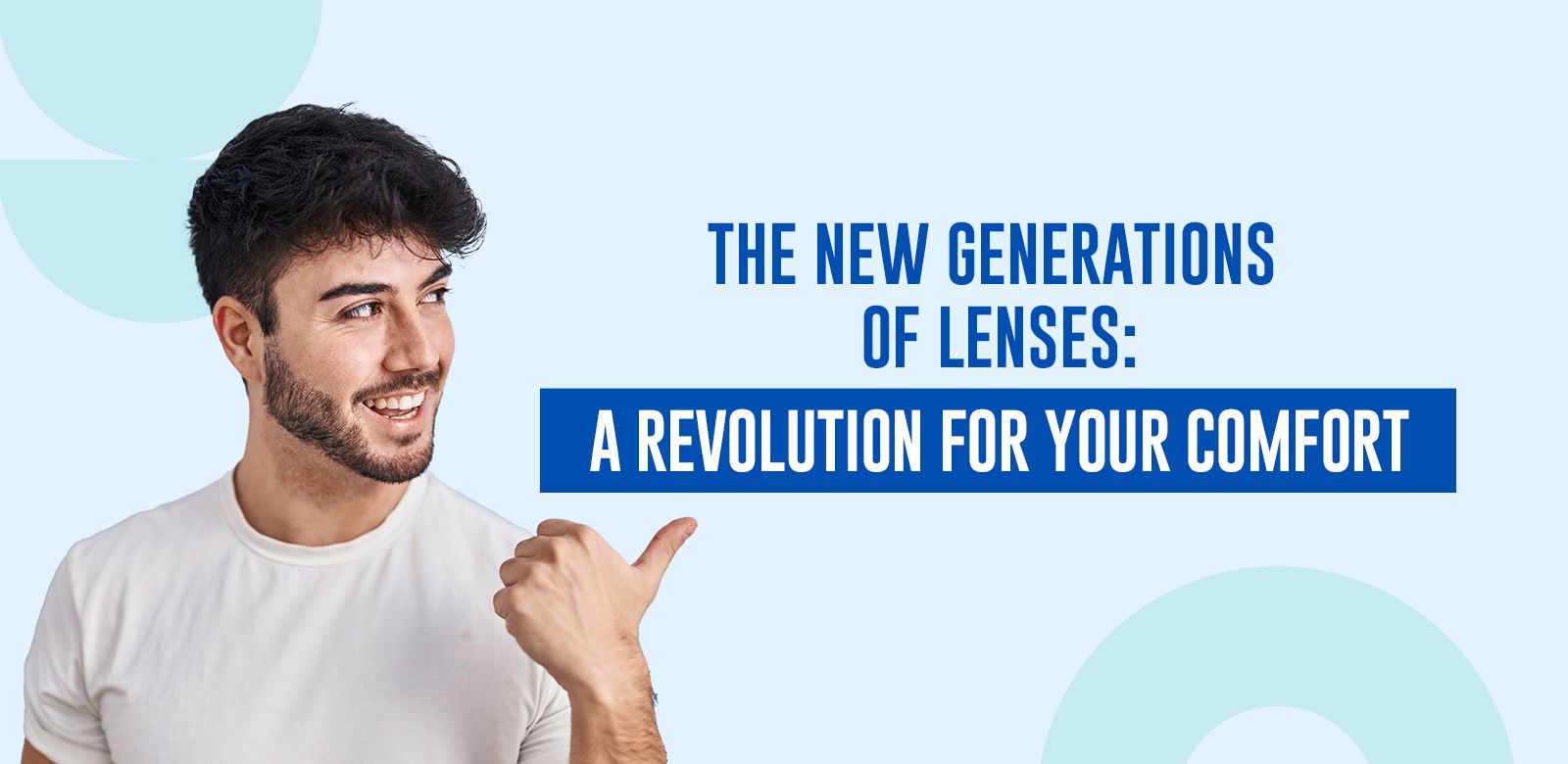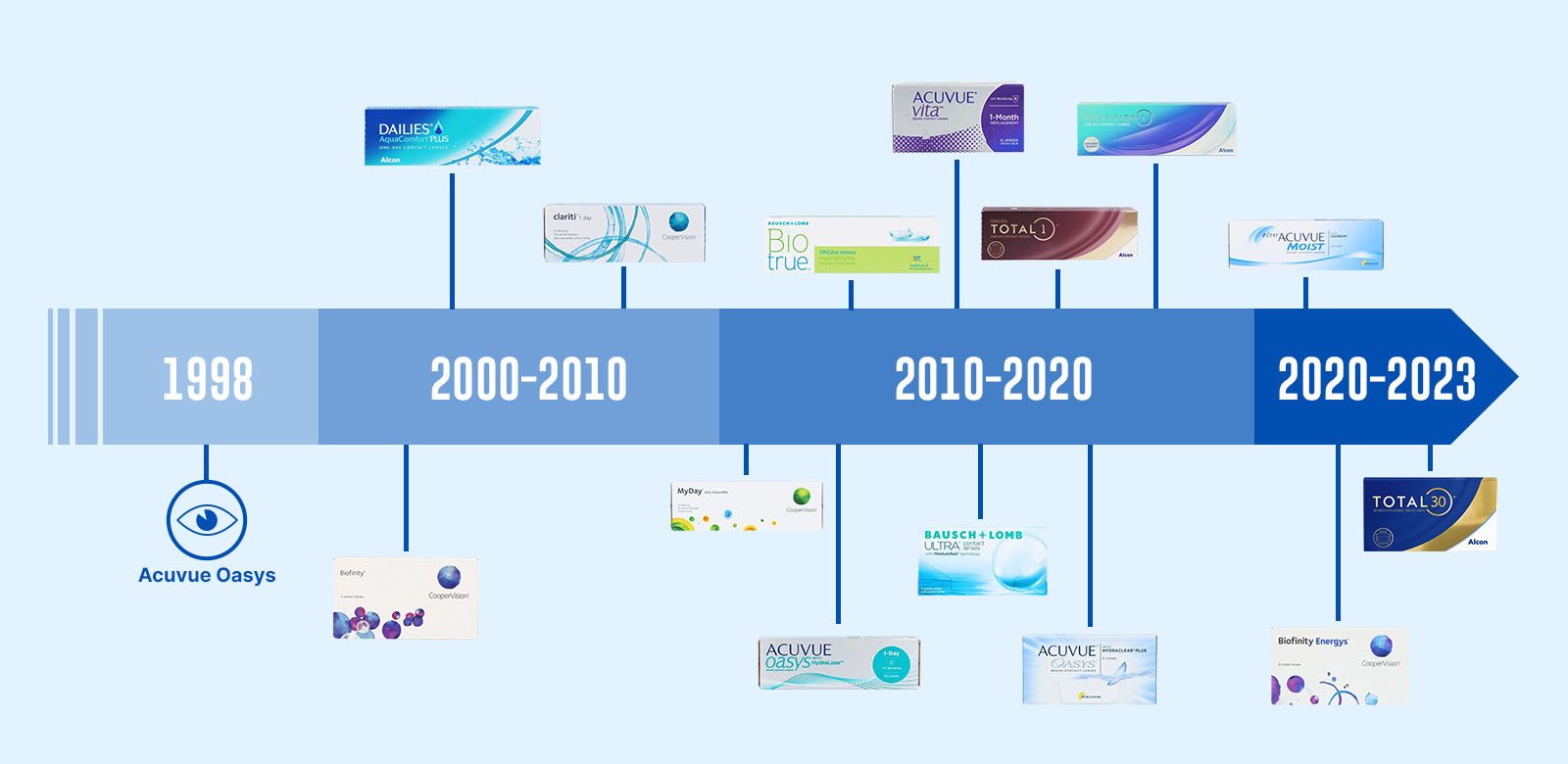

Switching from glasses to contact lenses has undoubtedly transformed your daily life, offering greater comfort, a more immersive experience, and an unparalleled sense of freedom. But since purchasing your first pair of contact lenses, have you ever stopped to ask yourself if they’re still the best choice for your eyes?
The optical industry is constantly evolving, with companies like Johnson & Johnson and Alcon investing heavily in research and development. Their goal? To design and create models that are increasingly comfortable, effective, and eye-health friendly.
This article will take you through the history of contact lenses, from the 1980s to today. You’ll discover how every technological breakthrough has revolutionized life for contact lens wearers.
Key milestones
Before the 1980s: promising beginnings, but uncomfortable
Rigid lenses, introduced in the 1950s, were durable and provided sharp vision. However, their low oxygen permeability (the amount of oxygen that can pass through the lens to the eye) often caused significant eye dryness and irritation. At that time, comfort was not yet a priority.
The 1980s: a revolution with soft hydrogel lenses
It wasn’t until the advent of soft hydrogel lenses in the 1980s that comfort became a focus. These lenses were made from materials with water content ranging from 38% to 79%, offering better hydration for the cornea. They provided unprecedented comfort at the time.
For contact lens wearers, they were a practical alternative to glasses and a more comfortable option compared to rigid lenses. However, their oxygen permeability was still somewhat limited.
The 2000s: the era of silicone hydrogel lenses
In the 2000s, a significant breakthrough emerged: silicone hydrogel lenses. By incorporating silicone into their composition, these lenses offered high oxygen permeability, allowing up to five times more oxygen to pass through compared to hydrogel lenses.
The result? They were far more comfortable to wear, caused less eye irritation, and could be worn for longer periods. Silicone hydrogel lenses perfectly matched the demands of modern life, where long days and challenging conditions (air conditioning, prolonged screen exposure, etc.) are the norm.
Since the 2010s: beyond comfort
Today, contact lenses don’t just correct your vision—they’re designed to protect and improve your eye health. Here are some of the latest innovations:
-
Advanced hydration technologies: These ensure continuous hydration throughout the day, even in dry environments.
-
UV filters and blue light protection: Some models include filters to shield your eyes from harmful rays and screen exposure.
-
Next-generation multifocal lenses: Perfect for people with presbyopia, they ensure a seamless transition between different vision zones.
How do next-generation contact lenses make a difference?
At Linsenmax, we strongly encourage you to try next-generation models. Even if you’re fully satisfied with your current lenses, as the history of contact lenss shows the industry is constantly evolving. The latest innovations provide unmatched comfort and adapt much better to today’s lifestyle demands: prolonged screen exposure, extended wear time, and more.
Trace the history of contact lenses through this timeline
Below, you’ll find a visual timeline showcasing key dates in contact lens development and the technologies introduced. You might be surprised by the launch date of your own lenses! Afterward, you’ll find a comparison table to help you identify next-generation models that are undoubtedly better suited to your current needs.


Tableau comparatif des modèles actuels et des nouvelles alternatives
| Category | Frequency | Current Lenses | Recent Alternatives |
| Spherical | Daily | Dailies AquaComfort Plus | Dailies Total 1 |
| Spherical | Daily | 1-Day Acuvue Moist | 1-Day Acuvue Oasys Max |
| Spherical | Monthly | Air Optix Plus HydraGlyde | Total 30 |
| Toric | Daily | Dailies AquaComfort Plus Toric | Dailies Total 1 for Astigmatism |
| Toric | Daily | 1-Day Acuvue Moist for Astigmatism | Acuvue Oasys 1-Day for Astigmatism |
| Toric | Monthly | Air Optix HydraGlyde for Astigmatism | Total30 for Astigmatism |
| Multifocal | Daily | Dailies AquaComfort Plus Multifocal | Dailies Total 1 Multifocal |
| Multifocal | Daily | 1-Day Acuvue Moist Multifocal | 1-Day Acuvue Oasys Max Multifocal |
| Multifocal | Monthly | Air Optix HydraGlyde Multifocal | Total 30 Multifocal |
Find your ideal lenses with help from your eye care specialist
Wondering if a next-generation lens might be right for you? We strongly recommend consulting an ophthalmologist, optometrist, or optician to reassess your needs. Their expertise will help identify the most suitable options and explain how they can transform your daily life.
Give your eyes the best comfort with innovative technologies
These next-generation lenses are designed to improve your vision and protect your eye health.
Our increasingly demanding lifestyles make it essential to invest in our well-being. Your eyes deserve the best on the market, so don’t wait—try these latest advancements in contact lenses today.
This article is provided for informational purposes only and does not replace an eye exam, prescription, or personalized advice from an eye care professional.





